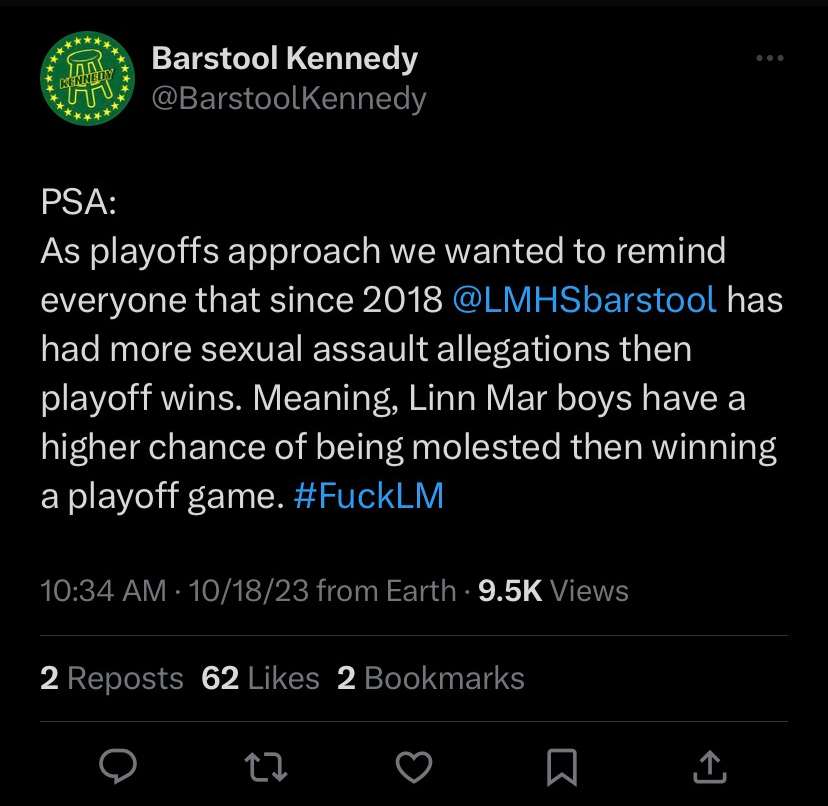Youth at Kennedy and high schools across America face serious issues with social media misuse, specifically with platforms like X (previously known as Twitter), Snapchat and Instagram. People have normalized profane, violent and sexual content. There is no longer a line that divides what is and is not appropriate. Does signing up for social media make you a target?
@KennedyBarstool, an X account anonymously run by a Kennedy student or students, is a profile designated to post updates and commentary, mainly regarding sports. However, it is done so in a crude manner. The account is also known for posting taunts and spreading rumors about students.
“I saw one post on [Kennedy Barstool] saying ‘Linn-Mar boys have more chance of being sexually assaulted than winning the playoff game’,” Kennedy sophomore Sammy Wheeler said. “I don’t think it was appropriate. It was a harmful thing to say to both Kennedy and Linn-Mar.”

The post above, posted by @KennedyBarstool, goes to show what people feel comfortable saying behind an anonymous username. Similar posts are made by the account, trash-talking other schools and students. The account has numerous chain responses going back and forth with other high schools such as Bettendorf, Washington and Linn-Mar.
@KennedyBarstool has even shared personal information to the account, posting screenshots of messages with a student’s father and commenting on their relationship. Once again, a line in ethics and civility is crossed as the commenter can face no real repercussions from behind a screen.
X isn’t the only social media platform that allows controversial content. A survey in the fall of 2021 by Statista found that Snapchat was the most important social network for 35% of U.S. teens, outranking TikTok (30%).
Snapchat’s ‘class stories’ were first launched as ‘campus stories’ in 2014, beginning at universities. The concept has since expanded to high schools. Students can publicly post on a story titled by their graduation year. They are also able to view stories posted by all other grades at their school.
Snapchat class stories allow messages to get out fast to the student body. However, they pose a significant issue as well. Students share photos, videos and negative discussions aimed at teachers and other students.
Snapchat has a story feature known as SendIt, a separate, but compatible app with Snapchat. Due to the anonymity of replying to others’ stories on SendIt, graphic and inappropriate content is easily shared on the platform. Students can “SendIt” while remaining anonymous. There have been several instances of defamatory or profane content being shared on the Kennedy Class of 2025 Snapchat story in this way. Screenshots of several students’ private stories were shared publically of the class story. These included responses to SendIts that were asking personal, inappropriate questions.
Under the advice of my advisor, I will not include the posts shared on the Class of 2025 story. Our publication takes the ethics of our position seriously and will not risk offending our readers with graphic, vulgar, offensive content. One of our responsibilities as journalists is to do no harm and I believe it would be harmful to include these screenshots, many of which include specific students’ full names followed by content that could potentially follow them around for the rest of their lives—often by no fault of their own.
While choosing not to acknowledge the behavior of my peers by reposting the content, it seems to be the new norm. Teens see posts like these every day. The problem is that we have all become so desensitized, that we no longer have a filter of our own.

Instagram accounts are also a culprit in desensitization among the student body. It can be fun, especially when it comes to seeing your classmates’ terrible parking (@khs_bad_parking_) or laughing at peers caught sleeping in class (@khs.caughtnappin). The student body believes these accounts are well-natured, but upon further inspection, it becomes clear the harm they cause. The digital footprint is real.
@fridaybeers.khs is one of the student-run pages on Instagram. The account consists of sharing “bad” photos of people, posted on Thursdays and Fridays. Content is curated by the student body sending photos to the account owner.
The owner of the Instagram account agreed to an interview, saying that the @fridaybeers.khs account was only meant in good humor. The account holder wished to maintain anonymity throughout the interview.
“I only made the account because I was influenced by my friend and I was bored,” the account owner said.
They said that most of the time, the pictures sent in from the student body were from close friends of the person, trying to be funny. Boys especially would send in photos of their friends, the justification being that boys don’t care as much about bad photos of them being posted. Right?
However, not everyone sent photos in as a friendly joke. @fridaybeers.khs also received photos from other anonymous accounts, some with the intent of causing harm.
“One picture I was sent by another anonymous person was a picture of two girls in my grade lifting their shirts up,” @fridaybeers.khs said. “Obviously I didn’t post that, but it was a really crazy thing to send in.”
This goes to show that the anonymity social media provides can bring out the cruelty of the teen spirit. While some followers of the account think it is funny, others are hurt.
“[A student] was posted multiple times,” @fridaybeers.khs said. “[They] texted me saying [they] wanted to ‘kill whoever runs this account’.”
While it would be easy to look at the owner of this account, and others like it, as the ones at fault, we should look deeper, toward the root of the problem. Today’s youth has deemed this behavior acceptable.
Students often don’t think of these as acts of cyberbullying. Teens refuse to recognize the damage social media causes because we are also the perpetrators of it.
“People were coming after the account,” @fridaybeers.khs said. “Even though there were already accounts made like this.”
@fridaybeers.khs has since taken a break from posting on the account when rumors of who ran the account started circulating. Staying anonymous was important because had it been a personal account, no one would have posted the same type of content. It’s the type of behavior that could impair a user’s opportunities for the rest of their life.
“[Running the account] was fun because we got terrible photos of people,” @fridaybeers.khs said. “But it was also stressful, because, if someone found out about it, it would put me in an extremely bad position.”
All of these accounts, while centered around Kennedy High School, are technically not “affiliated” with the school. Meaning no regulation or censoring can be enforced by school officials. With little risk of being found out, the student body becomes bolder in their anonymous online prescences.
So why engage with this type of content if we know it is wrong? While writing this article, I sometimes found it difficult to navigate my reporting. It’s a little hypocritical—I too see shocking posts, yet I am intrigued. At first glance these posts have a “shock and awe” factor, even seeming funny to me at first.
The problem is me, the problem is you, the problem is everyone.
Most vulgar and defamatory content can be posted anonymously online with absolutely no consequences. Filters and restrictions on what people can share online are not well-regulated enough, however, we can’t just expect social media platforms to solve our problems for us. The behaviors of teens online have curated violence and cyberbullying in social media.
We are missing an accountability system, but more importantly, we are missing a support system. We’re all alone in a mess of our own making and we’re only falling deeper into the hole of desensitization.


